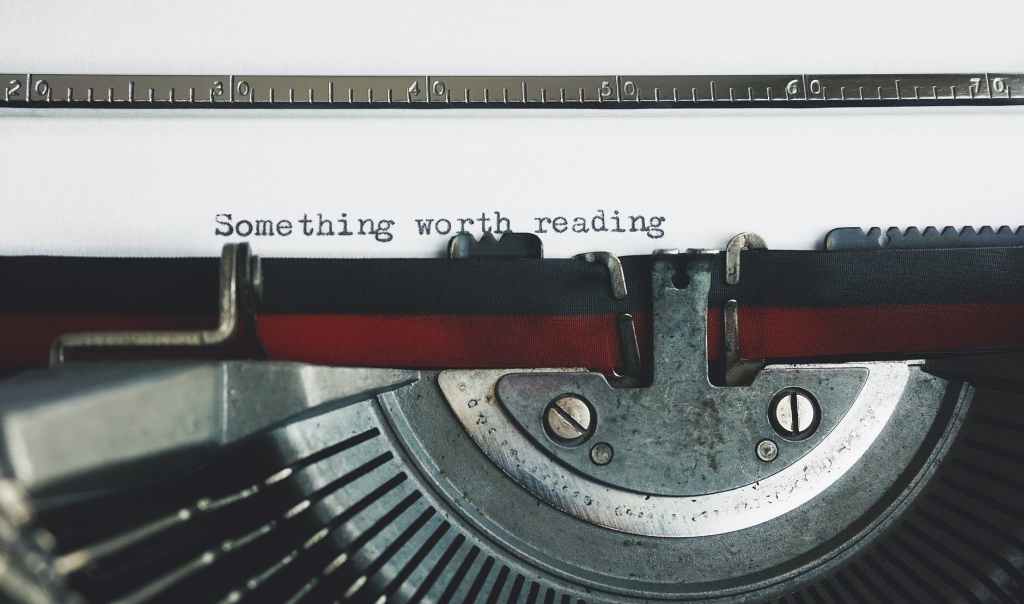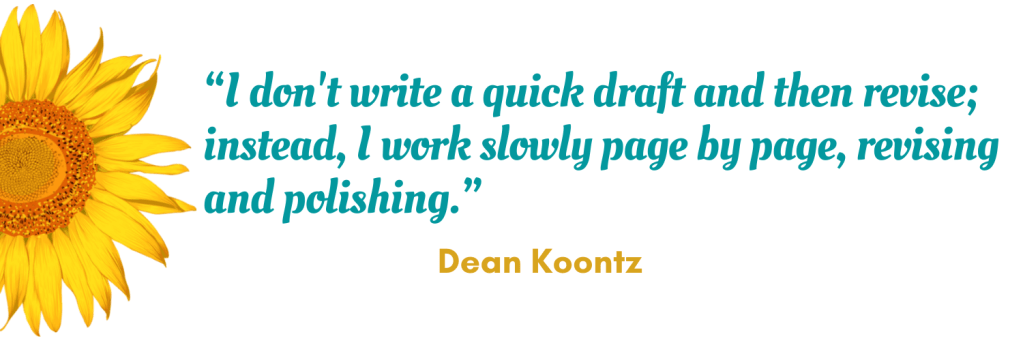Why Writers Should Consider Revising Slower To Improve Manuscript Quality

There are plenty of fast writers out there that can rival Stephen King’s ability to complete any manuscript length in three months. Many aspiring authors, debut novelists, and those trying to land book deals get inspired by King and other fast writers. The one thing we all forget is that the man’s been writing since 1967!
Fifty-five years is longer than some of us have been alive. I mention King because he’s one of my all-time favorite authors. His writing advice is a favorite in the #writingcommunity. Many writers turn to King’s well-known memoir “On Writing” and dogmatically attempt to practice his advice on how much time a first draft should take.
“The first draft of a book—even a long one—should take no more than three months, the length of a season,” King has famously advised.
I’ve been able to crank out first drafts in three to four months, too. Though, trying to write quickly can backfire. From my own writing experience and being a professional reader, having read for Lit and TV agencies in the past, I’ve learned that writing fast can lead to structural issues and, hence, major rewrites.
Writing Faster Can Mean Poor Quality First Drafts
Anyone can brag that they can write at Stephen King’s pace or even faster. If you’re inspired like John Boyne, then you could even say that you’ve been able to write your novel over a weekend. Boyne was said to have written, “The Boy in the Striped Pajamas,” originally published as “The Boy in the Striped Pyjamas,” in 2.5 days! This is incredibly fast and by no means the norm.
It reminds me of Mark Zuckerberg and Bill Gates dropping out of college and then later becoming filthy-rich billionaires. Many speeches have been made to university students in college, insisting that these two men are unique exceptions. The truth is that 94% of U.S. leaders did attend college, according to an article spotlighting the myth about college dropouts.
So, what’s the point of all this?
The point is there are no quick shortcuts. A small fraction of individuals can drop out of college and become loaded young billionaires such as Zuckerberg. Likewise, similar to winning the lottery, it’s rare to compare ourselves or try to have some “ah-hah!” moment a la John Boyne. It’s uncommon to write a full-length manuscript in 2.5 days. It is equally as rare that a quickly written piece of work ends up good enough to not only get a book deal but is optioned and turned into a popular movie.
If you’re one of the uber-fast writers, well, good for you. If your work is not only fast but soundly structured, paced perfectly, has little to no grammatical issues, plus contains developed and flushed out three-dimensional characters all on the first try—even better. But I’ve learned in most cases, it’s not how fast you write, but how messy your first draft is. When I say messy, it’s not always elementary line stuff. It can be a combination of problems.

Methodical Revision Tips To Reduce Chances For Major Rewrites
Why rush the revision process? Being impatient can be detrimental to our manuscripts because we all have only one shot at hooking agents, publishers, and our readers. When we rush the process, we lose our audience with a story that was simply never ready. Even if your manuscript is clean on a line-level, being too rushed can lead to problematic storylines, plot holes, and generic one-dimensional characters that aren’t fleshed out. There can be pacing that is either too slow or too quick (yes, rushed pacing is a thing), and you might struggle with an ending that feels hastily wrapped up.
I humbly admit to not being some all-knowing creative professional. I’m simply an aspiring author with agency experience and one that is hopefully learning from mistakes that not only I’ve made but ones I’ve seen commonly made by other aspiring authors. I believe in being a student for life. I believe as writers we can never truly call ourselves masters. Even the best authors can still learn from mistakes. Sharing our knowledge about our craft requires being a source of encouragement and motivation for each other as we navigate our writer’s journey together.
Below are three ways most writers of all skill levels can improve their manuscripts and WIP during rewrites:
- Don’t Show Your Manuscript Too Early: I belong to several writing groups and at least two other beta/critique partner Facebook groups. One of the most common issues I see is writers being too eager to show their work prematurely. Yes, you can disclaim that your manuscript is very rough prior to showing it. But you do yourself a considerable disservice getting too excited too quickly and wanting someone to read it too soon. I never share my work with beta readers unless I’ve gone over the manuscript myself several times.
- Be Prepared For Multiple Revisions: If you’re self-publishing or going the indie-publishing route, then it’s a lot easier to do fewer revisions. But if you’re looking to land an agent, said agent will most likely want to do rounds of revisions with you. This can take time, given that they have other authors to attend to and not just your manuscript. It’s up to each writer to accept revision requests. In my opinion, the less married you are to your words, the better. Some writers stubbornly stand behind what they wrote and defensively argue their vision. It’s better to be more objective, especially when you’re first starting out. Obviously, established best-selling authors have more say than debut novelists.
- Read Your Manuscript Cover To Cover Multiple Times: With each new revision, it’s imperative you re-read your complete manuscript multiple times. You can consider leaning on a critique partner to help you with this process or do numerous rounds of beta readers. But the important thing is showing it to your beta readers or critique partners after you’ve gone through it yourself at least three times. You want to show people clean work. You want to show work when it’s as close to being done as possible. Otherwise, first impressions will likely be negative. Readers might trip up over line issues, clumsy sentences, have problems with the pacing, and much more.
The Bottom Line
When you go through the three steps above and avoid rushing the revision process, you’ll be surprised at how much more ready your manuscript will be. It’s even better if you don’t rush the writing process. That’s why some writers don’t believe or participate in NaNoWriMo every November, because of the high probability of a very sloppy first draft crammed into one month. The most important thing is getting your words down on paper, but it’s also essential to understand the value of quality over quantity.
Unfortunately, there are no shortcuts when it comes to the publishing process. It’s a long, labor-intensive process. I’ve had to read some of my manuscripts over fifteen times or more, cover to cover. Some writers are much faster than others, and some write very clean drafts requiring minor rewrites in terms of developmental components. Others discover the true story during multiple rewrites. It’s better to take your time and get it right than to crank out a very bad first draft and you have to scrap nearly all of it during the revision process. Patience isn’t always a virtue for us creative folk, but embracing each step toward our publishing journey is about our willingness to learn and humbly be a forever student at our craft.

This entry was posted in Writing and tagged Aspiring Author, Authors, Books, Editing, Publishing, Revising, Writer's Journey, Writers, Writing, Writing Community.
13 thoughts on “Why Writers Should Consider Revising Slower To Improve Manuscript Quality”
Leave a comment Cancel reply
This site uses Akismet to reduce spam. Learn how your comment data is processed.

April 8, 2022 at 6:16 AM
Slow and steady wins the race, as the famous fable teaches.
LikeLiked by 1 person
April 8, 2022 at 11:10 AM
It certainly does, at least that’s been my experience. 🙂
LikeLiked by 1 person
April 8, 2022 at 7:28 AM
I really like this post! I am a slow writer, and though I can read fast, I usually read slow so I can analyze another writer’s style, technique, etc.
LikeLiked by 1 person
April 8, 2022 at 11:17 AM
I tend to be a slowish reader and a faster writer. I’ve been slowing down my writing process lately. Like you, I also analyze books and read them slowly for writing style and technique too.
LikeLike
April 8, 2022 at 7:56 AM
Slow and steady sometimes wins the race. Howdy. Your essay has a lot of good advice. Neil S.
LikeLiked by 1 person
April 8, 2022 at 11:18 AM
Thanks for reading Neil. I feel like we can all learn from each other and hopefully grow as writers.
LikeLiked by 1 person
April 8, 2022 at 2:16 PM
right
LikeLiked by 2 people
April 8, 2022 at 9:16 AM
These are good points, one tip I heard was to read it backwards, apparently it shows up loads of errors.
You don’t read it literally backwards of course, just start the last bit first.
LikeLiked by 1 person
April 8, 2022 at 11:19 AM
That is very interesting. I haven’t read my book backward yet, but I’ve jumped around at times working on the areas that I know need to work. Then I’ll read it from the very beginning and make more notes, then repeat the process.
LikeLike
April 10, 2022 at 12:55 PM
Well written!
LikeLiked by 2 people
April 11, 2022 at 3:32 PM
I agree. I have five short stories to finish and 15 done. I need deep edit. Not a fast thing to be done. Thank you for sharing your advice and knowledge.
LikeLiked by 2 people
April 17, 2022 at 1:46 PM
There’s something to be said about taking your time to get something right. With anything, there are many people in various professions that are extremely fast compared to their peers, but that doesn’t always mean they’re the best. Being slower at anything shouldn’t equate to being a bad thing. Our society has deemed that we must be faster, have more, make it bigger – that’s not always a good thing. Another good post!
LikeLiked by 2 people
April 17, 2022 at 1:50 PM
It’s definitely true that society expects things quickly. We’re living in the age of immediate gratification where we expect quick results. I partly blame this on the post-Internet-age where everything now is a quick Google search at our fingertips. Likewise, we’ve become accustomed to quicker results. That’s why traditional publishing is slower, but many aspiring authors decide on going the self-publishing route. It’s partly out of impatience with the whole process and having to deal with publishing gate-keepers. There aren’t any shortcuts in life. To do something right, I agree that being slower or more methodical isn’t always a bad thing.
LikeLiked by 2 people